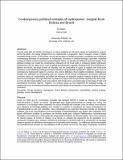Files in this item
Contemporary political ecologies of hydropower : insights from Bolivia and Brazil
Item metadata
| dc.contributor.author | Atkins, Ed | |
| dc.contributor.author | Hope, Jessica | |
| dc.date.accessioned | 2021-05-27T11:30:08Z | |
| dc.date.available | 2021-05-27T11:30:08Z | |
| dc.date.issued | 2021-04-11 | |
| dc.identifier | 274371308 | |
| dc.identifier | bc17697c-130e-4455-af72-473ee65999f5 | |
| dc.identifier | 85105824002 | |
| dc.identifier | 000675857200019 | |
| dc.identifier.citation | Atkins , E & Hope , J 2021 , ' Contemporary political ecologies of hydropower : insights from Bolivia and Brazil ' , Journal of Political Ecology , vol. 28 , no. 1 , pp. 246-265 . https://doi.org/10.2458/JPE.2363 | en |
| dc.identifier.issn | 1073-0451 | |
| dc.identifier.other | RIS: urn:A90E1087864F6F04A5030F2288798303 | |
| dc.identifier.other | ORCID: /0000-0002-8726-8880/work/94669946 | |
| dc.identifier.uri | https://hdl.handle.net/10023/23263 | |
| dc.description | Funding: This research was supported by an ESRC Doctoral Studentship (Atkins, grant no: 1325180), RGS Environment and Sustainability Grant (Hope) and Vice-Chancellor's Research Fellowship at the University of Bristol (Hope). | en |
| dc.description.abstract | Twenty years after the World Commission on Dams published an oft-cited critique of hydroelectric projects across the globe, the energy infrastructure has experienced a renaissance. Dams, however, remain a highly contested energy source. In this article, we use two iterations of political ecology to challenge and complicate contemporary framings of hydropower as 'sustainable.' Focusing on political ecology's grounded, empirical reading of broader environmental and epistemological claims, we identify two different ways that insights from political ecology can reveal the contemporary relevance of the local scale in critiquing global hydropower infrastructure and its claims to be a part of global decarbonization agendas. Drawing from recent fieldwork in Bolivia and Brazil, we adopt frames of 'plurality' and the ‘production of space’ to analyze how local-scale dynamics of dam building challenge dominant definitions of sustainable hydropower. With the ‘green-ness’ of contemporary hydropower based on a narrow, CO2-centric definition, these insights complicate, challenge and broaden this definition by illuminating how the impacts of this energy infrastructure and power networks contradict claims of ‘sustainability’ and widen the relevance of respective projects' impacts, in terms of socionatures and ontologies. We argue that these hydropower projects limit the generative capacity of the local scale, in terms of place-based politics and socio-natures, and remake land- and waterscapes in the image of state and transnational extractive regimes. Together, our analysis opens up new trajectories for political ecology, to question the socio-environmental politics generated and enabled by the reworked environments of green energy production. | |
| dc.format.extent | 20 | |
| dc.format.extent | 279375 | |
| dc.language.iso | eng | |
| dc.relation.ispartof | Journal of Political Ecology | en |
| dc.subject | Bolivia | en |
| dc.subject | Brazil | en |
| dc.subject | Extractivism | en |
| dc.subject | Energy transitions | en |
| dc.subject | Hydropower | en |
| dc.subject | Plurality | en |
| dc.subject | Political ecology | en |
| dc.subject | Sustainability | en |
| dc.subject | Uneven development | en |
| dc.subject | GE Environmental Sciences | en |
| dc.subject | T-NDAS | en |
| dc.subject | AC | en |
| dc.subject | MCC | en |
| dc.subject | DOAE | en |
| dc.subject.lcc | GE | en |
| dc.title | Contemporary political ecologies of hydropower : insights from Bolivia and Brazil | en |
| dc.type | Journal article | en |
| dc.contributor.institution | University of St Andrews. Geographies of Sustainability, Society, Inequalities and Possibilities | en |
| dc.contributor.institution | University of St Andrews. School of Geography & Sustainable Development | en |
| dc.identifier.doi | 10.2458/JPE.2363 | |
| dc.description.status | Peer reviewed | en |
This item appears in the following Collection(s)
Items in the St Andrews Research Repository are protected by copyright, with all rights reserved, unless otherwise indicated.

